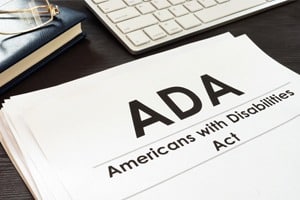
In 1990, the Americans with Disabilities Act (ADA), a civil rights law, was passed in order to protect individuals with disabilities in various areas of life. No matter whether it’s in regards to jobs, schools, public or private locations, or transportation, the purpose of the Act is to be sure that individuals with disabilities are afforded the same rights as those without disabilities.
On its 29th anniversary, Daggett Shuler would like to provide valuable information about the Act and explain what it encompasses. The following are the five separate sections (“titles”) of protection of which the ADA is composed.
Title I – Employment
Regulated and enforced by the U.S. Department of Justice, Title I of the ADA entitles individuals with disabilities to the same employment opportunities and benefits as those without disabilities. This is applicable to employers who have at least 15 employees. Reasonable accommodations must be offered to those applicants with disabilities who are otherwise qualified. A “reasonable accommodation” is one that enables the employee to do their job without any “undue hardship” to the employer. An employer cannot refuse someone employment for a position that they are otherwise qualified for, only because of their disability. Nor can they be terminated for the same.
Title II – Public Services: State and Local Government
Title II of the ADA, also regulated and enforced by the U.S. Department of Justice, prohibits discrimination against individuals with disabilities with respect to public entities. These entities, such as state and local agencies, must ensure that their services, activities, policies, procedures, and programs offered are accessible to individuals with disabilities.
Title III – Public Accommodations and Services Operated by Private Entities
Title III focuses on the rights of individuals with disabilities in public places, which also include those that are privately owned (e.g. restaurants, movie theaters, and sports stadiums). It defines the minimum standards necessary for any new construction and provides that existing public places remove barriers wherever necessary, making “reasonable accommodations” for customers with hearing, vision, and speech disabilities, barring undue hardship to the owner.
Title IV – Telecommunications
Title IV, regulated by the Federal Trade Commission, requires that telephone and Internet service companies create services (such as closed captioning of federally funded public service announcements on TVs) that allow individuals with speech or hearing impairments to communicate.
Title V – Miscellaneous Provisions
The last title of the ADA includes other provisions that focus on the ADA as a whole, such as its relationship to state laws, insurance benefits, retaliation, and more. It also includes a list of what conditions are not considered to be a disability for purposes of this Act.
As we celebrate the 29th anniversary of the Act on July 26th, the values of the Act remain as relevant as ever. Individuals with disabilities deserve the same rights as those without. Therefore, when an entity does not comply with the rules of the ADA, an individual with a disability who is involved may have a case. Unfortunately, these cases can be difficult to prove, which is why it is so important to consult with an experienced and knowledgeable disability attorney who can help.
At Daggett Shuler we are proud to work with individuals with disabilities in order to help them to obtain any benefits to which they may be entitled. To learn more about your rights or to schedule a free consultation, call us at 800-815-5500 today!

